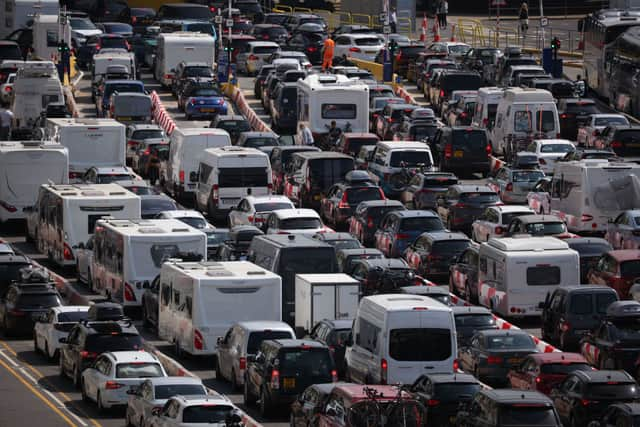Port of Dover warns of two-and-a-half hour queues this weekend as summer holidays begin
and live on Freeview channel 276
Holidaymakers travelling from the Port of Dover this week are being warned to expect two-and-a-half hour delays.
The Kent port issued the alert ahead of many schools in England and Wales breaking up for the summer holidays on Friday (21 July).
Advertisement
Hide AdAdvertisement
Hide AdThe port said that enhanced post-Brexit passport checks by French border officials have significantly increased processing times.


Car passengers embarking on summer getaways from Friday are being urged to arrive up to three hours before their booked sailing - two hours earlier than was advised last year.
By comparison, before the end of the Brexit transition period the port gave no advice to passengers about when to turn up.
Port bosses are taking measures to help minimise queues during the summer holidays, including installing an additional PAF booth and creating hour-by-hour traffic flow projections.
Advertisement
Hide AdAdvertisement
Hide AdThe port is also continuing to use a new system for processing coach passengers involving Advanced Passenger Information checks being carried out away from the main port facility during busy periods.
This system was first introduced for the May half-term after some coach passengers were stuck at the port for more than 10 hours during Easter.
Port of Dover chief executive Doug Bannister said: “When passengers arrive at the Port of Dover, they will be processed through border controls – anticipated to take around 90 minutes on peak days.
“However, our modelling indicates that processing times may be up to two-and-a-half hours during the peak hours of 6am to 1pm during the first couple of Saturdays and Sundays of the summer holidays, due to the extreme popularity of these days.
Advertisement
Hide AdAdvertisement
Hide Ad“We care about every passenger that chooses to travel via the Port of Dover and have worked hard to ensure the best experience possible as they transit through on their summer holidays.”
Mr Bannister added that staff have done “everything we possibly can” to minimise delays for passengers but warned that unforeseen circumstances, such as technical issues, strikes, or road traffic accidents on approaches to the port, could result in longer queues.
He said: “If these happen that could throw us some more challenges.What Dover has demonstrated time and time again is that we can be very resilient in our operations and clear the disruption very quickly.”
The warning over long delays this weekend comes after the Channel Tunnel boss slammed the incoming EU border system, saying it was designed “without any consideration” for cross-Channel travel.
Advertisement
Hide AdAdvertisement
Hide AdJohn Keefe, chief corporate and public affairs officer at Getlink, which operates the Channel Tunnel, said it will be difficult to process passengers in cars and coaches once the European Union’s Entry/Exit System (EES) is introduced.
The launch of the scheme has been repeatedly delayed and there is speculation it will not come into force until after the Paris Olympics in summer 2024.
The system is expected to involve travellers from non-EU countries such as the UK having their fingerprints scanned and a photograph taken to register them on a database the first time they enter a member state.
But there are concerns it will cause long queues for train and ferry passengers travelling from Dover as border checks for people entering the EU are carried out there before they embark on their cross-Channel journeys. This system is in contrast to flights, which will involve passengers’ details being taken at destination airports.
Advertisement
Hide AdAdvertisement
Hide AdIt is likely it will only add to the already long delays during peak periods at the Port of Dover due to French border officials carrying out enhanced post-Brexit checks.
Giving evidence to the Commons’ European Scrutiny Committee, Mr Keefe said: “This scheme was designed for airports, quite simply without any consideration for the nature of transport that happens across the Channel.
“For a one ticket, one seat, one person approach in a large indoor environment where there is space to put both kiosks for the data capture and also additional space for border officials, it’s easy.
“Where it struggles is when cars drive through large open spaces – car parks – in all weathers, in all lights, at all times of the day or night.
Advertisement
Hide AdAdvertisement
Hide Ad“The data capture has to look at individuals who are deep inside a vehicle. That then becomes very complicated. The scheme is not designed for the purpose it’s being addressed to. It’s designed for comfortable airports in EU territory.”
Mr Bannister, who previously warned EES could increase the time it takes to process a car from around 90 seconds to 10 minutes, described the system as a “critical” issue which could affect “the health of the nation”.
He told the committee: “Half of our freight traffic is destined north of London. It is impossible to imagine levelling up the country if the Short Straits is not working well. This new regulation that’s coming in has got a potential large strategic impact on the health and prosperity of the nation. That’s why we feel it is so important.”
Mr Bannister added that in the past six months “demonstrable progress” has been made by government officials showing a “willingness to engage” with France and the EU Commission in an attempt to minimise disruption from EES.
Comment Guidelines
National World encourages reader discussion on our stories. User feedback, insights and back-and-forth exchanges add a rich layer of context to reporting. Please review our Community Guidelines before commenting.
